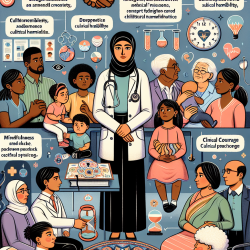The issue of systemic racism in healthcare has been a longstanding challenge, particularly affecting the management of chronic noncancer pain among Black, Indigenous, and People of Color (BIPOC). The research article "Chronic Noncancer Pain Management and Systemic Racism: Time to Move Toward Equal Care Standards" by Ghoshal et al. sheds light on the disparities faced by BIPOC patients and offers insights into how practitioners can improve their skills to provide equitable care.
Understanding the Impact of Systemic Racism
The history of racism in medicine dates back centuries, with deep-rooted biases influencing patient care and outcomes. The research highlights that BIPOC patients often receive inadequate pain management due to implicit biases and stereotypes held by healthcare providers. These biases lead to undertreatment and poorer health outcomes for BIPOC individuals compared to their White counterparts.
The article emphasizes that implicit bias affects various aspects of the care continuum, including access to care, quality of treatment, and patient-provider communication. This bias contributes to a cycle of mistrust and anxiety among BIPOC patients, further exacerbating health disparities.
Actionable Steps for Practitioners
To address these disparities, practitioners must take proactive measures to enhance their skills and provide equitable care. Here are some actionable steps based on the research findings:
- Cultural Sensitivity Training: Incorporate comprehensive cultural sensitivity training into medical education curricula. This training should focus on understanding implicit biases, health disparities, and cultural competence.
- Diverse Representation: Increase the representation of BIPOC professionals in healthcare leadership roles. Encourage more BIPOC individuals to pursue careers in medicine, particularly in pain management specialties.
- Individualized Pain Assessment: Adopt an individualized approach to pain assessment that considers cultural context and economic factors influencing treatment decisions.
- Culturally Competent Communication: Utilize culturally competent interpreters when necessary to improve communication with BIPOC patients. Engage in open dialogues about race and culture to foster trust and collaborative treatment decisions.
- Continuing Education: Mandate continuing education requirements for healthcare providers focusing on racial/ethnic sensitivity issues. This will ensure ongoing awareness and skill development in addressing systemic racism.
The Role of Policymakers
The research also calls for policymakers to play a crucial role in dismantling systemic racism within healthcare systems. By incorporating BIPOC voices in policy decisions and incentivizing the inclusion of BIPOC professionals in healthcare fields, policymakers can help create a more equitable system.
The introduction of financial incentives for BIPOC individuals pursuing careers in pain management could also help address the underrepresentation of these groups in the field. Such measures would not only improve patient trust but also lead to better health outcomes for BIPOC communities.
A Path Forward
The journey toward equal care standards requires collective effort from practitioners, educators, and policymakers. By implementing the research findings and taking decisive action against systemic racism, we can move closer to achieving equitable pain management for all patients.
The time for change is now. As practitioners committed to providing quality care, it is our responsibility to address these disparities head-on and work toward a more just healthcare system.










